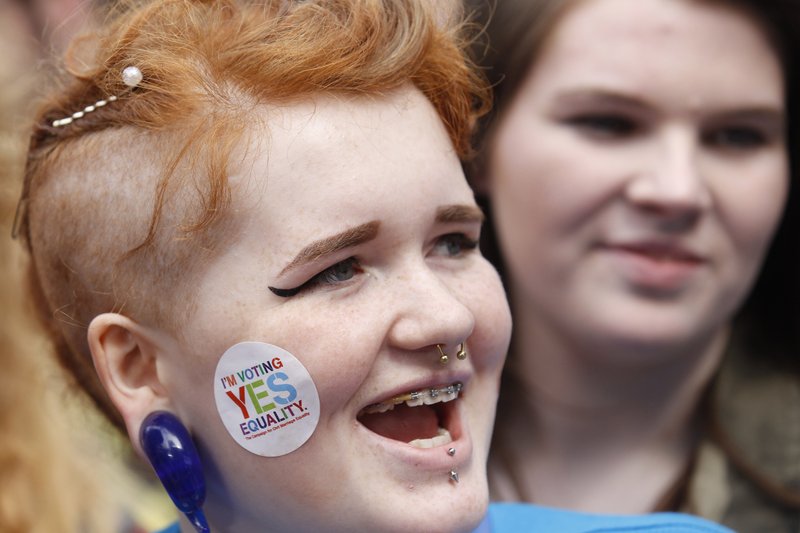DUBLIN -- Gay couples in Ireland woke up Sunday in what felt like a nation reborn after the Irish people voted with a strong 62 percent "yes" to enshrine the right to gay marriage in the country's conservative 1937 constitution.
The country's Justice Department confirmed Sunday that it plans to draft a marriage bill this week that will permit those taking vows in civil ceremonies to choose either to be "husband and wife" or "spouses of each other." It will ensure no church is required to perform a gay marriage, a key demand of the dominant Catholic Church, and also the main Protestant and Muslim communities in Ireland.
Deputy Prime Minister Joan Burton said she expects the bill to become law by early July. Because existing law requires a minimum three-month notice for any civil marriages, the first gay weddings cannot happen until the fall.
For Sen. Katherine Zappone and Ann Louise Gilligan, their day has nearly come. Since 2003, they have fought for legal recognition of their Canadian marriage, suffering setbacks and delays as they sued the state all the way to the Supreme Court.
"For so long, I've been having to dig in my heels and say ... well, we are married. I'm a married woman!" said Zappone, a Seattle native who settled with her Irish spouse in Dublin three decades ago.
"We are now entering a new Ireland," said Gilligan, a former nun.
Saturday, Zappone broke off from a live TV interview, stared directly into the camera, and asked Gilligan to marry her all over again.
"I said yes to Katherine 12 years ago at our marriage in Canada," Gilligan, nearby, shouted to the crowd. "And now we are bringing the 'yes' back home to Ireland, our country of Ireland!"
Sunday, the couple reflected on their road to social acceptance and the remaining wait to get officially hitched in Ireland -- before Christmas, they hope.
"It took us hours to get a taxi [Saturday night] because so many people came up to us in tears, wanting to talk to us. They now felt so much freer, and proud," said Zappone, who became Ireland's first openly lesbian lawmaker when Prime Minister Enda Kenny appointed her to the Senate in 2011.
Thousands of revelers celebrated until dawn after the result was announced Saturday night.
"There aren't that many moments in life where you are surrounded with an exuberance of joy. These are rare moments," said Gilligan, a former Loreto nun who left the order in her mid-20s to pursue social justice as a lay Catholic.
They married in Vancouver and sued Ireland for legal recognition, but in 2006 the High Court ruled that Irish law, while never explicit in defining marriage as solely between a man and woman, universally understood this to be the case. The Supreme Court kicked their appeal back to the High Court in 2012.
Months later, Gilligan, who is in her late 60s, was hospitalized with a brain hemorrhage. Zappone faced bureaucratic presumptions when trying to see her wife, since hospital admissions didn't recognize her as a spouse or other family member. She could have said they had a civil partnership, a weaker form of marriage-style contract enacted into Irish law in 2010, but Zappone insisted: "I am married to her, and you have to recognize that," she recalled.
The medical staff understood.
It will take months for the couple to have an Irish-recognized marriage.
The family section of Ireland's Constitution eventually will read, "Marriage may be contracted in accordance with law by two persons without distinction as to their sex." First, Parliament must pass the same-sex marriage bill. Analysts expect easy passage, since all parties support the measure. Then Ireland's ceremonial head of state, President Michael Higgins, will sign the bill into law and amend the constitution.
"Technically and legally we'll probably have to wait until toward the end of the year," Zappone said. "Then we'll head toward the big day."
A Section on 05/25/2015
